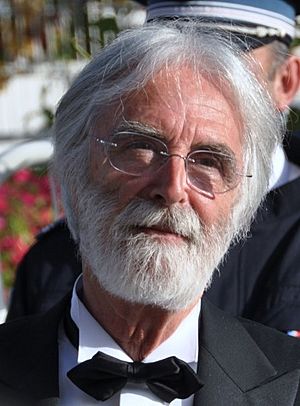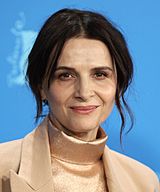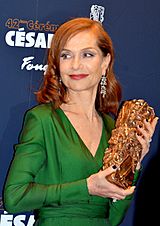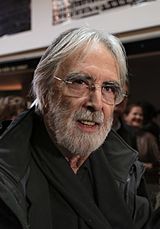Michael Haneke facts for kids
Quick facts for kids
Michael Haneke
|
|
|---|---|

Haneke in 2009
|
|
| Born | 23 March 1942 Munich, Germany
|
| Nationality | Austrian |
| Alma mater | University of Vienna |
| Occupation | Film director, screenwriter |
| Years active | 1974–present |
| Spouse(s) |
Susanne Haneke
(m. 1983) |
| Children | 1 |
Michael Haneke (born March 23, 1942) is an Austrian film director and writer. His movies often explore social problems and the feeling of being disconnected from others in modern life. Haneke has made films in French, German, and English. He has also worked in television and theater. He teaches film directing at the Film Academy Vienna.
Haneke became known for his "glaciation trilogy" of films. These were The Seventh Continent (1989), Benny's Video (1992), and 71 Fragments of a Chronology of Chance (1994). These films show how modern life can sometimes make people feel lonely.
He has won many awards for his work. He won the Grand Prix at the Cannes Film Festival for The Piano Teacher (2001). He also won the festival's top prize, the Palme d'Or, twice. He won for The White Ribbon (2009) and Amour (2012). Amour was also nominated for five Academy Awards and won for Best Foreign Language Film.
Contents
Early Life and Schooling
Haneke was born in Munich, Germany. His father, Fritz Haneke, was a German actor and director. His mother, Beatrix von Degenschild, was an Austrian actress. Haneke grew up in the city of Wiener Neustadt, Austria.
As a young person, Haneke loved literature and music. He has said that he was a bit of a "rebel" and didn't always enjoy school. He wanted to be an actor but did not pass the entrance exam for the acting school in Vienna.
Instead, he went to the University of Vienna. He studied philosophy, psychology, and drama. He spent a lot of his time watching movies in local theaters. After leaving the university, he worked as a film critic and later at a German television station. He directed his first TV movie in 1974.
Career as a Director
Starting in Television
Haneke began his career by directing many projects for television. His first TV movie was After Liverpool in 1974. He directed several other TV films in the 1970s and 1980s. This early work helped him develop his skills as a director.
Gaining Fame with Feature Films
Haneke's first movie for theaters was The Seventh Continent in 1989. This film showed the serious and bold style he would become famous for. Three years later, he directed the thought-provoking film Benny's Video (1992). It won an award from film critics at the European Film Awards.
His third film was 71 Fragments of a Chronology of Chance (1994). A critic from The New York Times called it a "cool study of violence."
In 1997, he directed the film Funny Games. The story is about a family whose vacation is interrupted by two young men who play cruel games with them. The film explores ideas about violence in movies and media.
International Success and Awards

In 2000, Haneke directed the French film Code Unknown, starring Juliette Binoche. The movie follows several different stories that connect with each other.
He had great success with the French film The Piano Teacher (2001). It starred Isabelle Huppert as a piano teacher with a troubled private life. The film won the Grand Prix at the 2001 Cannes Film Festival. Its stars, Benoît Magimel and Huppert, also won the Best Actor and Best Actress awards.

In 2005, Haneke directed the thriller Caché, which means "Hidden" in French. The film is about a family that starts receiving mysterious, unsigned videotapes. For this film, Haneke won the Best Director award at the Cannes Film Festival.
His next film, The White Ribbon (2009), was shot in black-and-white. It is set in a small German village just before World War I. The story is about strange events that happen in the town. The film won the Palme d'Or at the 2009 Cannes Film Festival. It also won a Golden Globe Award.
More Recent Films
In 2012, Haneke directed Amour, which means "Love." The film is about an elderly couple, Anne and Georges, as they deal with old age and illness. The film won Haneke his second Palme d'Or at the 2012 Cannes Film Festival. It also won the Academy Award for Best Foreign Language Film. Haneke was nominated for Best Director and Best Original Screenplay.
His most recent film is Happy End (2017). It follows a wealthy French family dealing with various problems. The film looks at modern issues like the European refugee crisis and the lives of privileged people.
Haneke believes that movies should make audiences think. He says films with easy answers are just for entertainment. He wants his movies to give viewers space to use their own imagination.
Filmography
Feature Films
| Year | Title | Credited as | |
|---|---|---|---|
| Director | Writer | ||
| 1989 | The Seventh Continent | Yes | Yes |
| 1992 | Benny's Video | Yes | Yes |
| 1994 | 71 Fragments of a Chronology of Chance | Yes | Yes |
| 1997 | Funny Games | Yes | Yes |
| 2000 | Code Unknown | Yes | Yes |
| 2001 | The Piano Teacher | Yes | Yes |
| 2003 | Time of the Wolf | Yes | Yes |
| 2005 | Caché | Yes | Yes |
| 2007 | Funny Games | Yes | Yes |
| 2009 | The White Ribbon | Yes | Yes |
| 2012 | Amour | Yes | Yes |
| 2017 | Happy End | Yes | Yes |
Television Work
| Year | Title | Credited as | Notes | |
|---|---|---|---|---|
| Director | Writer | |||
| 1974 | After Liverpool | Yes | Yes | TV movie |
| 1976 | Three Paths to the Lake | Yes | Yes | |
| Sperrmüll | Yes | Yes | ||
| 1979 | Lemminge | Yes | Yes | TV mini series; 2 episodes |
| 1983 | Variation – oder Daß es Utopien gibt, weiß ich selber! | Yes | Yes | TV movie |
| 1984 | Who Was Edgar Allan? | Yes | Yes | |
| 1986 | Fraulein – Ein deutsches Melodram | Yes | Yes | |
| 1991 | Nachruf für einen Mörder | Yes | Yes | TV movie documentary |
| 1993 | Die Rebellion | Yes | Yes | TV movie |
| 1997 | The Castle | Yes | Yes | |
| 2013 | Così Fan Tutte | Yes | No | |
| TBA | Kelvin's Book | Yes | Yes | TV series |
Awards and Honors
Michael Haneke is one of the most celebrated directors in modern cinema. He is the only Austrian director to have won the Palme d'Or at the Cannes Film Festival twice.
- Cannes Film Festival: He won the Grand Prix for The Piano Teacher (2001), Best Director for Caché (2005), and the Palme d'Or for The White Ribbon (2009) and Amour (2012).
- Academy Awards: His film Amour won the Academy Award for Best Foreign Language Film. Haneke himself was nominated for Best Director and Best Original Screenplay for the film.
- Golden Globe Awards: The White Ribbon won the award for Best Foreign Language Film.
In 2013, Haneke received the Prince of Asturias Award for the arts, a major honor in Spain.
See also
 In Spanish: Michael Haneke para niños
In Spanish: Michael Haneke para niños
 | Bayard Rustin |
 | Jeannette Carter |
 | Jeremiah A. Brown |


